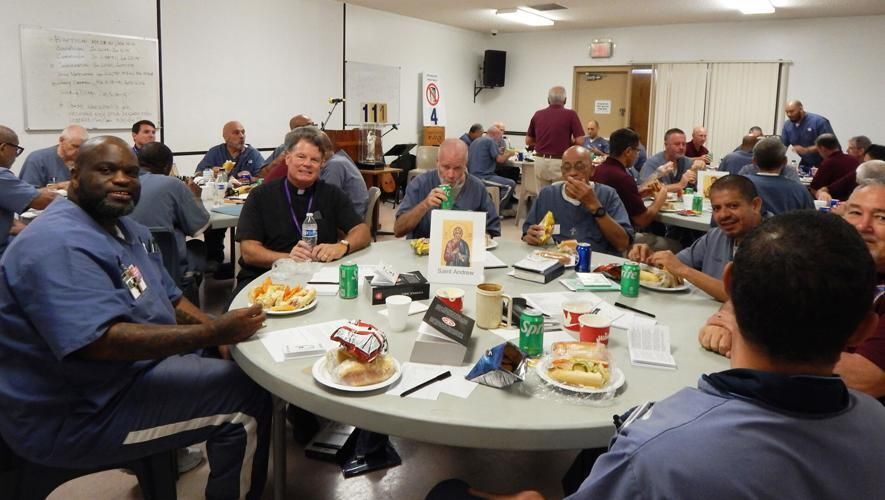
RIVIERA BEACH | It’s hard to miss the mandate from Jesus to visit the imprisoned. It’s in the Gospel of Matthew, Chapter 25, along with his urging to feed the hungry, give drink to the thirsty, welcome the stranger, care for the ill and clothe the naked. Wrapped up in those clear directives from the Lord is the mission of Catholic Charities, and one of the cornerstones of that mission is prison ministry.
Not every Catholic Charities agency has prison ministry, said Ellen Wayne, CEO of Catholic Charities for the Diocese of Palm Beach, adding that the faithful mustn’t pick and choose the elements of Matthew 25 that suit their preferences.
“We’re blessed to have prison ministry as part of our offerings of services and people who are willing to roll up their sleeves in support and to help us deliver it,” she said. “It can’t be a one-person show. We can have one person organize it, but it really does require many hands, both in terms of the ordained and the soon-to-be ordained, as well as the laity.”
Deacon Greg Quinn is the one who leads the agency’s Prison Ministry program, with the help of an assistant and 127 current male and female volunteers. The diocese is fortunate to have more volunteers than five of the six other dioceses in Florida, he said.
“People are retiring in this area. They want to give back, and so this is their opportunity, as long as I get out there and preach in the parishes and let them know that there’s an opportunity available,” Deacon Quinn said.
It’s a ministry of presence, he added, reaching out to thousands of inmates in 14 correctional/detention facilities in the five counties that comprise the Diocese of Palm Beach — Palm Beach, Martin, Okeechobee, St. Lucie and Indian River. (For a perspective on why local people choose to minister to inmates, see accompanying article.)
“It’s such an intimate ministry. You will find the spiritually thirsty, the hungry, the stranger, the naked, the ill and, of course, the imprisoned. That’s where Jesus experienced all those things. Jesus was arrested. Paul was arrested,” he said.
One of the most uplifting and life-changing initiatives of Prison Ministry is a Catholic retreat program called Rescate, which is Spanish for rescue, that started in the Archdiocese of Miami in the mid-1980s. Deacon Quinn was approached a few years ago about offering Rescate retreats at prisons in the Palm Beach Diocese. He had led prison ministry in Newark, New Jersey, and was well versed in Kairos, which are Christian retreats for prisoners.
“I like the ecumenical aspect of it (Kairos), but it doesn’t have Eucharistic adoration, it doesn’t have confessions through the weekend, you’re not allowed to talk about the saints of the Catholic Church and, above all, don’t talk about Mary,” he said. Rescate has all of those essential Catholic ingredients.
After extensive planning by the Rescate team, two retreats a year — one in English and one in Spanish — are offered at Martin Correctional Institution near Indiantown, offering inspiring talks and the sacraments. While 20 men serve on the retreat team, about 15 women are brought in to sing hymns for the inmates on Saturday night, Deacon Quinn said.
The heart of a Rescate retreat is the writing of palanca letters, messages of encouragement and love from people in the region that are presented to the inmates. Again, those incarcerated tough guys are shown that someone on the outside is concerned for them.
Wayne said she is often asked if Catholic Charities has service opportunities for teens. In May, she attended Bishop Gerald M. Barbarito’s baccalaureate Mass for John Carroll High School in Fort Pierce and, walking into St. Anastasia Church, she was stopped by two students inquiring about summer community service. “I’ll think of something,” she told them.
The bishop’s homily was about Blessed Carlo Acutis, who died at age 15 and is set to become a saint Sept. 7. The homily sparked an idea to ask the students to write letters of support to inmates. “One of those John Carroll students actually wrote palancas,” she said. “He wasn’t the only one. There were other adults and even some staff. But interesting that the bishop was speaking of how technology was what helped elevate this young person (Acutis) to canonization.
“I think when we talk about prison ministry, there are folks who have the skillset, the patience and the willingness to actually insert themselves within the facility,” Wayne said, “but we also rely on others who have the willingness and appreciation to pray and at the very least understand the importance of what it is we’re doing.”
The safety of volunteers willing to enter a local jail or prison is given the highest priority, Deacon Quinn said. The screening process for involvement in prison ministry is stringent, with background checks required by the diocese and state and local law enforcement, along with Protecting God’s Children training. Ministry volunteers must complete an orientation program before being allowed into a correctional facility for cell-to-cell counseling, he said. And new volunteers are paired with seasoned veterans at first so they can learn the ropes.
“My duties are primarily to provide sacraments and services, Bible studies, and ministerial, spiritual counseling, not clinical,” Deacon Quinn said, adding that he encourages students from St. Vincent de Paul Regional Seminary to go through the program. He anticipates 18 seminarians to start soon, which will bring the number of future priests who served in prison ministry to 121.
While Deacon Quinn has witnessed total conversions to the Catholic faith and many inmates completing their sacraments of initiation, the main fruit of prison ministry is their change in behavior.
“They realize there is hope behind the walls of these places. That there are people who do care about them,” he said. “Most people that I’ve ever encountered, once they realize that their families wouldn’t pick up their phone calls, they just get down to the point where they don’t feel that anyone cares anymore. Literally, I’ve had men fall in front of me in fetal positions when I told them, ‘Look, I’m able to help you in that situation,’ and they just start crying.”
The intangible benefits of working in prison ministry are many. As Wayne said, “As much as we want to believe we are the face of Jesus, if you really open yourself to the experiences, you see the face of Jesus in others and you become the one who gains.”
To learn more about Catholic Charities’ Prison Ministry, visit www.ccdpb.org/programs/prison-ministry/. Contact Deacon Quinn at 561-360-3326, ext. 283, or gquinn@ccdpb.org.

